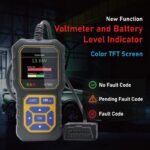An Adaptador Obd2 Bluetooth allows you to connect your smartphone or tablet to your car’s computer system to diagnose problems and monitor performance. Choosing the right adapter is crucial for a successful connection and accurate data. This guide will help you navigate the world of OBD2 Bluetooth adapters, ensuring you find a reliable tool for your needs.
Understanding OBD2 Bluetooth Adapters
ELM327-based OBD2 adapters facilitate communication between diagnostic software, like Car Scanner, and your vehicle’s Engine Control Unit (ECU). The adapter’s quality directly impacts connection stability and data accuracy. There are various types of adapters, categorized by their connection method:
- Wi-Fi: Connects wirelessly to your device via Wi-Fi.
- Bluetooth Classic (1.x, 2.x, 3.x): Uses older Bluetooth technology for a generally faster connection.
- Bluetooth Low Energy (LE) (4.0 and above): Offers lower power consumption but may have slower data transfer speeds compared to Bluetooth Classic.
- Bluetooth MFi: Certified by Apple for seamless integration with iOS devices.
Choosing an Adaptador OBD2 Bluetooth for iOS (iPhone/iPad)
Car Scanner on iOS supports Bluetooth LE (4.0), Wi-Fi, and Bluetooth MFi adapters. Classic Bluetooth adapters (versions 1.x, 2.x, 3.x) are not compatible with iOS due to operating system restrictions.
Recommendation: For iOS, Bluetooth LE (4.0) adapters offer the best balance of convenience, connection stability, and affordability. If speed is paramount, consider investing in a Bluetooth MFi certified adapter. Wi-Fi adapters are prone to connection issues and are generally less recommended. Pay close attention to the Bluetooth version before purchasing!
Choosing an Adaptador OBD2 Bluetooth for Android
Android devices support Classic Bluetooth, Bluetooth LE, and Wi-Fi adapters.
Recommendation: Classic Bluetooth generally provides the fastest and most reliable connection for Android. However, some Android devices may experience interference when multiple Bluetooth devices are connected simultaneously. Bluetooth LE is a suitable alternative if power consumption is a primary concern.
Selecting a Quality ELM327 Adapter
Adapter versions and chip types are less important than overall functionality. Focus on finding a reliable adapter that works consistently.
“Bad” adapters can exhibit various issues:
- Connection failures: The adapter may not connect at all or experience intermittent drops.
- Instability: Freezing, rebooting, and sensitivity to temperature or humidity can disrupt operation.
- Limited command support: Some adapters only support a subset of necessary commands, hindering comprehensive diagnostics.
- Data loss or corruption: Inaccurate or incomplete data can lead to misdiagnosis.
- Potential damage: Faulty adapters can potentially harm your car’s electrical system.
Recommended Adaptador OBD2 Bluetooth Options
While specific product recommendations can change, reputable brands known for quality include:
- OBDLink (MX+, CX): High-end adapters with excellent performance and compatibility.
- vLinker (MC+, FS, MS): Offer a good balance of features and price, with firmware updates available to address potential issues.
- Vgate iCar Pro 2S: A reliable option compatible with various operating systems.
Adaptador OBD2 Bluetooth to Avoid
- xTool: Not ELM327 compatible and only works with proprietary software.
- Wired Adapters (USB, COM): Not supported by Car Scanner.
- Adapters with “mini” in the name: Often indicate low quality.
- Cheap, Unbranded Adapters: High likelihood of encountering performance issues.
- Specific Brands: KONNWEI, Micro Mechanic, THINMI.COM, and KUULAA are often associated with reliability problems.
Investing in a quality adaptador OBD2 Bluetooth is essential for accurate vehicle diagnostics. Research carefully, consider your device’s operating system, and prioritize reliable performance over price. A good adapter will provide valuable insights into your car’s health for years to come.


